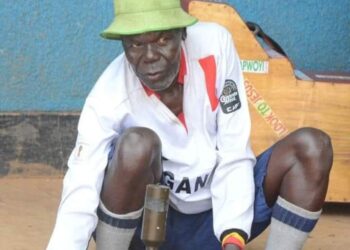By William Musoke
I have never found a health centre in a village of more than 160 households without patients. I found one in Muleete village in Kitenga Sub County in Mubende district.
Soon it became clearer why the disease burden in this village had reduced when other villages were grappling with illnesses ranging from stomachache to typhoid.
Muleete village mastered something that many villagers don’t do. The secret was in their habit of washing hands with soap.
If you want to teach parents anything, use their children.
The trick is working in Muleete village in Kitenga Sub County, Mubende District.
Children at Agape Community School have through music and drama effectively passed on messages about public health to their parents and the community at large. And their parents are listening attentively.

Muleete is now a model community where diseases related to poor hygiene are no longer a major problem and it is saving lives, money and time for the locals.
It all started with children.
Ahishake Ezekiel and Nuwahereza Rachel are some of the children at Agape Community School Muleete village in Kitenga Sub county, Mubende District. They have been trained by SNV officials to prevent catching and spreading sanitation and hygiene related diseases.
Ahishake and Nuwahereza in primary five and six respectively are some of the children that have mastered talking about sanitation and hygiene. They could actually pass for social workers.
In the absence of government facilities in the area, the church founded establishment works with a Unicef funded project implemented by SNV.
The church is at the heart of development in this area. They offer health care and computer literacy services to the pastoralist community of Muleete, among other things.
Founded by Rev Wilson Sentongo about 20 years ago, the pastor of Muleete Community Church allowed in public health workers to teach children good sanitation and hygiene practices. Drama and music are some of the tools used to influence the community to turn against their backward practices that had kept diseases in their households.
“Over 50% of people here used to suffer from typhoid and other unsafe water related diseases,” says Regina Mukisa, the head teacher of Agape Community School.
However, through embracing simple technologies like digging pit latrines and washing hands before and after meals, after toilet or cleaning babies, diseases have reduced.
The Hand Washing Secretariat hosted by SNV has been implementing the WASH training component. They work with an army of local health workers who have been preaching better Water, Sanitation and Hygiene practices in this community and others.

Mubende is a big district. It has 20 sub counties and a population of 756,100 according to the 2014 population census. And like other local government, its poorly funded by the central government to meet the needs of the community.
Local leaders say Muleete is a model which should be emulated by other villages.
Muleete’s children are empowered with knowledge to keep disease at bay. Part of their strategy was teaching children first before reaching the homes where they come from. So, from school, the children have been taught about making and using tippy taps.
On August 24, when a group of SNV and Unicef workers took their Japanese funders Saraya to the community, what took place at Agape School spoke volumes. Children such as Ahishake Ezekiel and Nuwahereza Rachel, were able to demonstrate and explain how tippy taps are made and why they are useful.
Everything was done before their parents and local government officials from Mubende district, who were all paying maximum attention.
Before Rev Ssentongo started this community, the pastoralist community didn’t have toilets, never washed their hands will free flowing water, and competed for drinking water with animals. Now, there is tap for the community although it is stressed, on top of clean water at the school for children usage as well as the health centre. The knowledge about sanitation and hygiene in the community has contributed to the reduction of the disease burden in the community.
Dysentery, stomach aches, diarrhea, among others which consumed their money and time, as well as medicines, have been lowered significantly. And the children looked healthy. Uganda is significantly rising its percentages of people with toilets as well as those that wash their hands in the recommended manner.

According to data at the National Hand Washing secretariat, about 66% wash their hands leaving a need of about 33% to educate. Sarah Rubereti, project officer at the NHWI says there are working with children to ensure the next generation of parents practice hand washing as a norm.
“If you want people to learn something, teach them while still young,” Rubereti said, adding that she appeals to Saraya through Unicef to scale up the support so that they can answer the call of locals to have many other sub counties in Mubende to benefit from this initiative. Rubereti explained that sanitation and hygiene related diseases contribute almost 80% to disease burden in households and the medical bills can be controlled by embracing good hand washing practices.
Do you have a story in your community or an opinion to share with us: Email us at editorial@watchdoguganda.com











